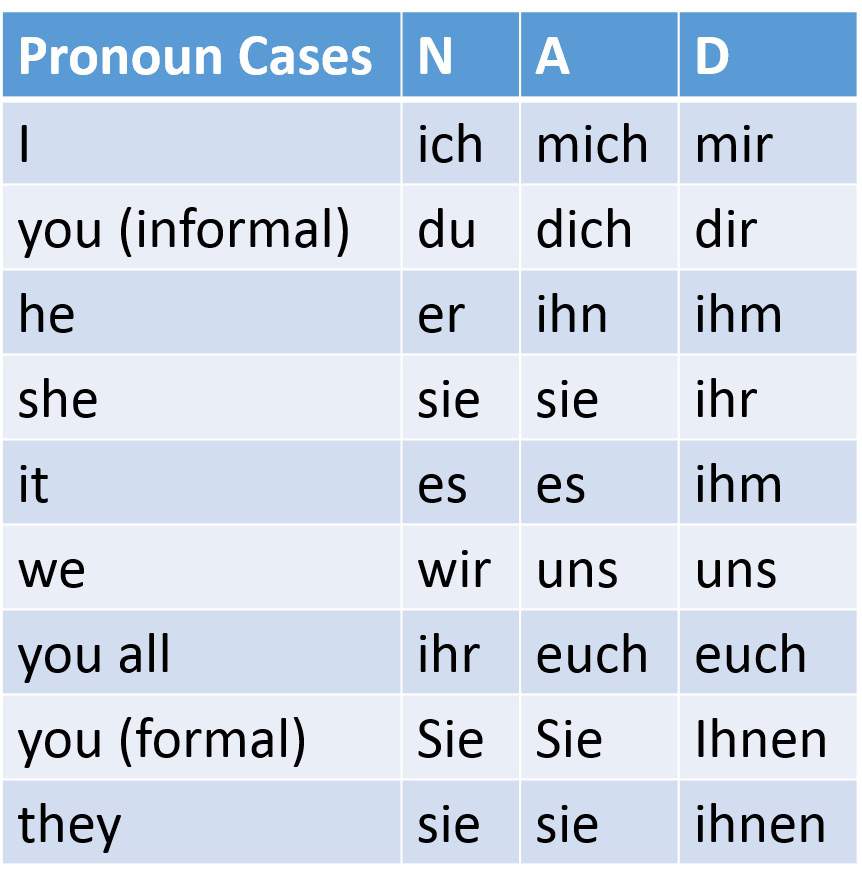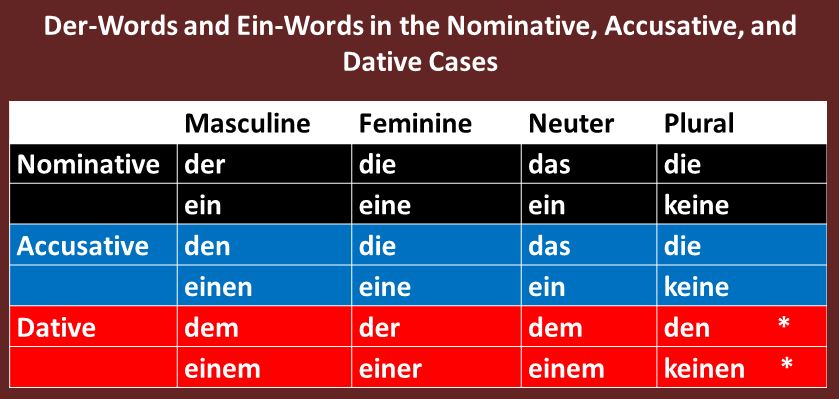
- #DATIV AKKUSATIV GERMAN GRAMMAR HOW TO#
- #DATIV AKKUSATIV GERMAN GRAMMAR PROFESSIONAL#
- #DATIV AKKUSATIV GERMAN GRAMMAR FREE#
The exam tests all four English language skills – reading, writing, listening and speaking. An A2 Key qualification is proof of your ability to use English to communicate in simple situations.
#DATIV AKKUSATIV GERMAN GRAMMAR PROFESSIONAL#
You can use language flexibly and effectively for social, academic, and professional purposes.What is A2 level English test?Ī2 Key, formerly known as Cambridge English: Key (KET), is one of our Cambridge English Qualifications. You can express yourself fluently and spontaneously without much obvious searching for expressions. Reaching B1 from A2 takes about 200 hours, so you're looking at roughly 450 hours of work from scratch.What level of German is fluent? Du lernst 15 wichtige Verben kennen.German Gra. They're not totally fluent, but it's not a huge struggle to understand what they're getting at or generally communicate with them. Deutsche Grammatik A2: In diesem Video geht es um sehr wichtige Verben mit Dativ und Akkusativ mit Beispielen. A2 level is not sufficient to pursue any course offered in German in Germany.Is A2 fluent?

(= Ich habe sie meiner Nichte geschickt.Is A2 German proficiency enough for an international student there?. Ich habe meiner Nichte eine Postkarte geschickt.Kaufst du deiner Oma Blumen zum Geburtstag? (= Kaufst du sie deiner Oma zum Geburtstag?).

Wir geben unserem Lehrer ein Geschenk.Tag 25 - Stadt Frankfurt Ihr braucht Papier, Bleistift, Kuli, Handout. Only in case the accusative object is a pronoun, the accusative precedes the dative. Immer Dativ und Akkusativ German language learning, German grammar, German langu. Important: the dative object must be before the accusative object. These 2 verbs have a double accusative! ( Ich frage es ihn. There are only 2 exceptions: fragen, kosten. Verbs: geben, schicken/senden, bringen, kaufen, schenken, leihen, sagen, erklären, erzählen, zeigen. But it is easy to distinguish which object is in accusative and which is in dative case: the person is always the dative and the other “thing” is the accusative. There are also many verbs that accept both cases. Ihr passt die Hose perfekt! (= Die Hose passt ihr perfekt.).Mir fehlt noch ein Anzug! (Ein Anzug fehlt mir noch.).the dative case is in the first position and the subject in the third: fehlen, gefallen, passen, passieren, schmecken, wehtun, es geht. ExamplesĪbout half of these verbs are often used with inversion, i.e.
#DATIV AKKUSATIV GERMAN GRAMMAR FREE#
TEST YOUR GERMAN Free with no obligation to buy. German grammar tips with Wunderbla, online German lessons. So small that you should learn by heart these verbs that only have one object in dative case: fehlen, folgen, gefallen, gehören, glauben, passen, passieren, schaden, schmecken, vertrauen, wehtun, es geht. German grammar rules and tips Reflexive pronouns accusative or dative Reflexive pronouns accusative or dative in German Understanding grammar is key to understanding a language.


Ich möchte/will/mag/trinke/bestelle keinen Kaffee.The only exception is the verb sein that always has nominative. The answer is quite easy: in general, assume that all the verbs take the accusative case (except those mentioned below in #2, these take the dative)! This group is the biggest of these two cases because the vast majority of verbs take the accusative.
#DATIV AKKUSATIV GERMAN GRAMMAR HOW TO#
In this post I’m going to explain the most usual verbs and how to distinguish between these two cases. Here is one of the most typical difficulties of learning German: knowing whether to use accusative or dative case with a verb.


 0 kommentar(er)
0 kommentar(er)
